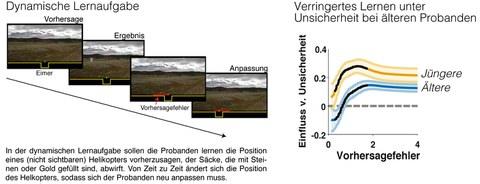Jun 13, 2016
Psychologists at TU Dresden study age differences in learning
Why do older people often have problems in adapting to changing or new situations? Why is the use of smartphones or other technology for them more difficult than for younger adults? A team of psychologists at TU Dresden and scientists from Berlin and the US have recently managed to find answers to these questions. This week, the renowned scientific journal “Nature Communications” thereon publishes a paper with the title "Age differences in learning emerge from an insufficient representation of uncertainty in older adults."
Recent work has highlighted that in younger adults the rate of learning increases when expectations about the environment are uncertain (uncertainty), outcomes are surprising (surprise), or contingencies are more likely to change (hazard rate). Moreover, younger adults have the ability to rationally regulate the rate of learning according to each of these factors. It is suggested that the factors that guide learning in dynamic environments are computed by separate neural subsystems.
In this study, the scientists applied a normative computational model of predictive inference to simulate possible effects of aging on these three factors. Subsequently, they verified the predictions of the computational model using a psychological task which required younger and older adults to dynamically calibrate learning according to ongoing assessments of uncertainty, surprise, and hazard rate.
The results of this study show that learning deficits observed in healthy older adults are driven by a diminished capacity to represent and use uncertainty in the service of learning. That is, tThese findings support the idea that differences in learning across healthy aging are driven by changes in upstream computational processes responsible for determining how much should be learned.
In their current research, the team focuses on two major questions: a) What are the neural mechanisms that drive the adaptive regulation of learning rates and how do they differ as a function of age? b) How does adaptive learning develop during childhood and adolescence and what are the computational mechanisms underlying developmental differences in learning?. The longer-term mission of the research program is to use knowledge derived from neuro-computational approaches to develop interventions supporting adaptive learning across the human lifespan.
http://www.nature.com/naturecommunications
Media inquiries:
Ben Eppinger
Technische Universität Dresden
Fachrichtung Psychologie
Tel.: +49 (0) 351 463-319 31
Fax: +49 (0) 351 463-421 94

